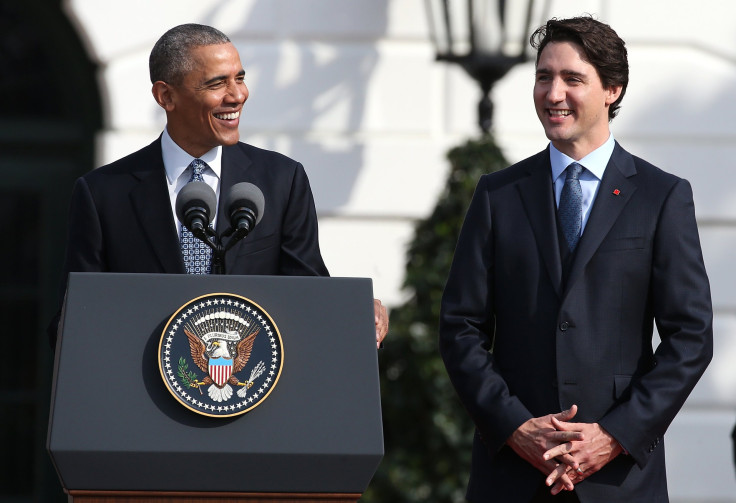Three Amigos Summit: North American Leaders To Discuss Brexit, Climate Change, Trade Protectionism In Ottawa

Canada will host U.S. President Barack Obama and Mexican President Enrique Pena Nieto at a summit of North American leaders, also called the Three Amigos summit, in Ottawa Wednesday.
This is the first such meeting between the North American leaders since early 2014 and the first high-level summit Canadian Prime Minister Justin Trudeau will host since taking office late last year.
Coming soon after the U.K.’s vote to leave the European Union last week, the summit faces increased pressure to showcase the stability of its own alliance. Climate change will be one of the central topics of the summit meeting and Obama’s address to the Canadian House of Commons.
The impending U.S. presidential election and the debate over trade protectionism will also be a matter of concern. All three countries reportedly see the summit as an opportunity to double down on easing trade barriers.
“This is a moment for North America to say we stand united, we stand together,” Chrystia Freeland, Trudeau’s trade minister, told Bloomberg Monday. “And as a continent, we have a partnership that believes in the importance of building bridges rather than building walls.”
Brexit Turmoil
Considering its impact on world financial markets, Brexit is set to be a topic of discussion at the summit. However, White House Press Secretary Josh Earnest said Tuesday that it won’t be the focus.
“What happened in Britain and what’s going on in American presidential politics absolutely has an effect: It makes everybody more nervous,” Bloomberg reported former Republican Congressman Vin Weber as saying.
“Certainly Brexit will be on the agenda,” the U.S. National Security Council’s senior director for western-hemisphere affairs Mark Feierstein reportedly said. “It’ll be evident to Americans and people beyond that when North America speaks and acts as a single unit, it’s really for the good of our citizens and people around the world.”
Environment and Climate Change
The leaders will also announce a North America-wide climate partnership to cut greenhouse gas emissions. They are expected pledge a joint goal of generating 50 percent of North America’s electricity from zero-carbon sources by 2025, up from the earlier 37 percent.
White House officials said that power mix would include wind, solar, hydropower, nuclear energy and coal or gas power paired with carbon capture technology. Mexico is expected to join an existing agreement between the United States and Canada to collectively curb methane emissions.
“Trudeau is facing the same fossil-fuel-lobby reality that Obama encountered,” said Paul Bledsoe, a former climate adviser in the Clinton administration, according to the New York Times. “In a way, Canada is a test case for the penetration of renewable energy in a fossil-rich country.”
Immigration Issues
Since 2009, Canada has required Mexicans to obtain a visa before entry. “There’s a lot of confusion in Mexico, hurt feelings and disenchantment with Canada over this issue,” Laura Macdonald, a professor of political science at Ottawa’s Carleton University, told Bloomberg.
Trudeau and Pena Nieto announced Tuesday during a bilateral meeting that the visa restriction would be lifted effective Dec. 1.
Protectionism Debate
All three countries have signed but not yet ratified the 12-nation Trans Pacific Partnership. The deal faces hurdles in the U.S. Congress and is opposed by both the presumptive presidential nominees Hillary Clinton and Donald Trump. The latter has even vowed to “rip up” the North America Free-Trade Agreement and other pacts.
One of Trump’s biggest supporters in Congress, Republican Senator Jeff Sessions of Alabama, reportedly said the Brexit vote could influence the evolution of American opinion, in the same way the era of Margaret Thatcher preceded President Ronald Reagan’s election: “The failed European Union experiment, and Great Britain’s rejection of it, must serve as a wake-up call for all of us in America.”
“The EU trade deal is not helped by what happened,” Canada’s former minister of foreign affairs, John Baird, said in an interview to Bloomberg last week. “There’s growing anti-globalization sentiment, there’s anger at elites. This is the big unknown the British people have thrown at all of Europe.”
© Copyright IBTimes 2024. All rights reserved.






















